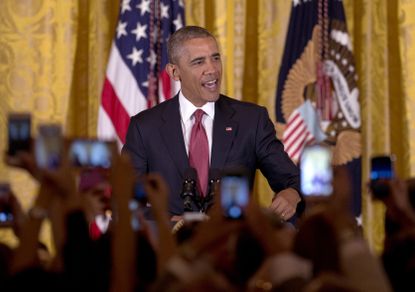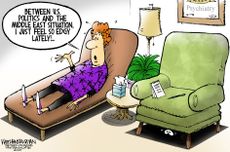How technology is destroying American democracy
Electronic democracy is not a good thing


At the dawn of the information age, technology promised to transform American politics into something close to a pure democracy. Each voter would be able to easily register his or her opinion on a variety of issues! Lawmakers would know exactly how their constituents felt! Consensus could be reached on how to fix even the nation's most intractable problems!
During the 1992 presidential campaign, billionaire populist Ross Perot waged an independent candidacy based on these ideas. He proposed "electronic town halls" — an idea he first advanced in 1969 — which would allow voters to give near-instant feedback to their elected officials using their televisions and phones. Perot's idea was so powerful that it was partly adopted during the campaign with town hall-style debates where audiences posed the questions instead of journalists. That conceit has been a fixture of debate season ever since.
But even as information technology has advanced to the point where most Americans have a computer in their pocket, our politics has gotten worse. Much worse. We're more connected than ever — yet our elected officials are more divided, less gets done, and voters are more angry than ever.
Subscribe to The Week
Escape your echo chamber. Get the facts behind the news, plus analysis from multiple perspectives.

Sign up for The Week's Free Newsletters
From our morning news briefing to a weekly Good News Newsletter, get the best of The Week delivered directly to your inbox.
From our morning news briefing to a weekly Good News Newsletter, get the best of The Week delivered directly to your inbox.
What Perot and other proponents of electronic democracy didn't foresee was how technology can be used to divide and splinter us.
Take gerrymandering, the drawing of odd-shaped congressional districts to maximize the strength of one political party. It's a practice that has endured for more than a century. But now, mapping technology has advanced to the point where districts can be easily drawn to include (or eliminate) not just neighborhoods, but individual blocks and even houses. The result is completely partisan districts that vote the same way in every election. Republicans were so effective at gerrymandering congressional districts after the 2010 Census that most political forecasters think it's nearly impossible for Democrats to win the House until after the next round of redistricting in 2020.
Technology has also given unprecedented influence to insurgent forces in American politics. While American political history has plenty of examples of insurgent candidates challenging the political establishment, it's been very difficult for them to gain a strong, long-lasting foothold and actually win elections. As we saw in the rise of the Tea Party in 2010, it's now much easier to harness the power of the grassroots. Technology has reduced parties' traditional role as major gatekeepers of power. This has made it harder for parties to forge compromises and pull together governing coalitions.
But perhaps most important, technology has changed how campaigns reach out to voters, work with the press, and raise money. Candidates used to win elections by appealing to the ideological middle, the swing voters with less allegiance to any political party. Technology now makes it easier for candidates to mobilize their bases — typically the most ideologically committed voters — and make sure they get to the polls. Each successive election over the last decade or more has led to a more partisan Congress. There are very few lawmakers left who could legitimately be considered swing votes.
There's little doubt that technology has made our lives better in many ways. But it seems to be destroying our politics.
Create an account with the same email registered to your subscription to unlock access.
Sign up for Today's Best Articles in your inbox
A free daily email with the biggest news stories of the day – and the best features from TheWeek.com
Taegan D. Goddard is the founder of Political Wire, one of the earliest and most influential political websites. He also runs Wonk Wire and the Political Dictionary. Goddard spent more than a decade as managing director and COO of a prominent investment firm in New York City. Previously, he was a policy adviser to a U.S. senator and governor. Goddard is also co-author of You Won — Now What? (Scribner, 1998), a political management book hailed by prominent journalists and politicians from both parties. Goddard's essays on politics and public policy have appeared in dozens of newspapers across the country, including The Washington Post, USA Today, Boston Globe, San Francisco Chronicle, Chicago Tribune, Philadelphia Inquirer, and Christian Science Monitor. Goddard earned degrees from Vassar College and Harvard University. He lives in New York with his wife and three sons.
-
 Why au pairs might become a thing of the past
Why au pairs might become a thing of the pastUnder The Radar Brexit and wage ruling are threatening the 'mutually beneficial arrangement'
By Chas Newkey-Burden, The Week UK Published
-
 'A direct, protracted war with Israel is not something Iran is equipped to fight'
'A direct, protracted war with Israel is not something Iran is equipped to fight'Instant Opinion Opinion, comment and editorials of the day
By Harold Maass, The Week US Published
-
 Today's political cartoons - April 17, 2024
Today's political cartoons - April 17, 2024Cartoons Wednesday's cartoons - political anxiety, jury sorting hat, and more
By The Week US Published
-
 Arizona court reinstates 1864 abortion ban
Arizona court reinstates 1864 abortion banSpeed Read The law makes all abortions illegal in the state except to save the mother's life
By Rafi Schwartz, The Week US Published
-
 Trump, billions richer, is selling Bibles
Trump, billions richer, is selling BiblesSpeed Read The former president is hawking a $60 "God Bless the USA Bible"
By Peter Weber, The Week US Published
-
 The debate about Biden's age and mental fitness
The debate about Biden's age and mental fitnessIn Depth Some critics argue Biden is too old to run again. Does the argument have merit?
By Grayson Quay Published
-
 How would a second Trump presidency affect Britain?
How would a second Trump presidency affect Britain?Today's Big Question Re-election of Republican frontrunner could threaten UK security, warns former head of secret service
By Harriet Marsden, The Week UK Published
-
 'Rwanda plan is less a deterrent and more a bluff'
'Rwanda plan is less a deterrent and more a bluff'Instant Opinion Opinion, comment and editorials of the day
By The Week UK Published
-
 Henry Kissinger dies aged 100: a complicated legacy?
Henry Kissinger dies aged 100: a complicated legacy?Talking Point Top US diplomat and Nobel Peace Prize winner remembered as both foreign policy genius and war criminal
By Harriet Marsden, The Week UK Last updated
-
 Trump’s rhetoric: a shift to 'straight-up Nazi talk'
Trump’s rhetoric: a shift to 'straight-up Nazi talk'Why everyone's talking about Would-be president's sinister language is backed by an incendiary policy agenda, say commentators
By The Week UK Published
-
 More covfefe: is the world ready for a second Donald Trump presidency?
More covfefe: is the world ready for a second Donald Trump presidency?Today's Big Question Republican's re-election would be a 'nightmare' scenario for Europe, Ukraine and the West
By Sorcha Bradley, The Week UK Published